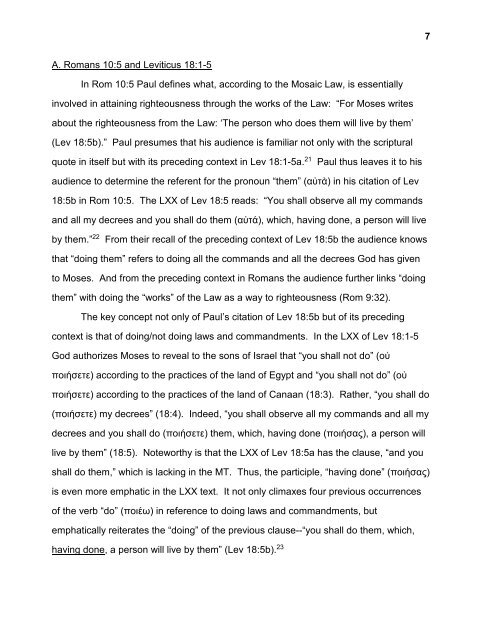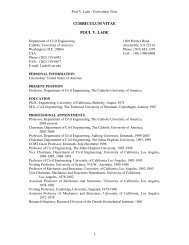Nota Bene-- C:\ARTICLES\TERMIN~1.NB Job 1 - the Catholic ...
Nota Bene-- C:\ARTICLES\TERMIN~1.NB Job 1 - the Catholic ...
Nota Bene-- C:\ARTICLES\TERMIN~1.NB Job 1 - the Catholic ...
You also want an ePaper? Increase the reach of your titles
YUMPU automatically turns print PDFs into web optimized ePapers that Google loves.
A. Romans 10:5 and Leviticus 18:1-5<br />
In Rom 10:5 Paul defines what, according to <strong>the</strong> Mosaic Law, is essentially<br />
involved in attaining righteousness through <strong>the</strong> works of <strong>the</strong> Law: “For Moses writes<br />
about <strong>the</strong> righteousness from <strong>the</strong> Law: ‘The person who does <strong>the</strong>m will live by <strong>the</strong>m’<br />
(Lev 18:5b).” Paul presumes that his audience is familiar not only with <strong>the</strong> scriptural<br />
quote in itself but with its preceding context in Lev 18:1-5a. 21 Paul thus leaves it to his<br />
audience to determine <strong>the</strong> referent for <strong>the</strong> pronoun “<strong>the</strong>m” (αυ� τα` ) in his citation of Lev<br />
18:5b in Rom 10:5. The LXX of Lev 18:5 reads: “You shall observe all my commands<br />
and all my decrees and you shall do <strong>the</strong>m (αυ� τα' ), which, having done, a person will live<br />
by <strong>the</strong>m.” 22 From <strong>the</strong>ir recall of <strong>the</strong> preceding context of Lev 18:5b <strong>the</strong> audience knows<br />
that “doing <strong>the</strong>m” refers to doing all <strong>the</strong> commands and all <strong>the</strong> decrees God has given<br />
to Moses. And from <strong>the</strong> preceding context in Romans <strong>the</strong> audience fur<strong>the</strong>r links “doing<br />
<strong>the</strong>m” with doing <strong>the</strong> “works” of <strong>the</strong> Law as a way to righteousness (Rom 9:32).<br />
The key concept not only of Paul’s citation of Lev 18:5b but of its preceding<br />
context is that of doing/not doing laws and commandments. In <strong>the</strong> LXX of Lev 18:1-5<br />
God authorizes Moses to reveal to <strong>the</strong> sons of Israel that “you shall not do” (ου�<br />
ποιη' σετε) according to <strong>the</strong> practices of <strong>the</strong> land of Egypt and “you shall not do” (ου�<br />
ποιη' σετε) according to <strong>the</strong> practices of <strong>the</strong> land of Canaan (18:3). Ra<strong>the</strong>r, “you shall do<br />
(ποιη' σετε) my decrees” (18:4). Indeed, “you shall observe all my commands and all my<br />
decrees and you shall do (ποιη' σετε) <strong>the</strong>m, which, having done (ποιη' σας), a person will<br />
live by <strong>the</strong>m” (18:5). Noteworthy is that <strong>the</strong> LXX of Lev 18:5a has <strong>the</strong> clause, “and you<br />
shall do <strong>the</strong>m,” which is lacking in <strong>the</strong> MT. Thus, <strong>the</strong> participle, “having done” (ποιη' σας)<br />
is even more emphatic in <strong>the</strong> LXX text. It not only climaxes four previous occurrences<br />
of <strong>the</strong> verb “do” (ποιε'ω) in reference to doing laws and commandments, but<br />
emphatically reiterates <strong>the</strong> “doing” of <strong>the</strong> previous clause--“you shall do <strong>the</strong>m, which,<br />
having done, a person will live by <strong>the</strong>m” (Lev 18:5b). 23<br />
7
















